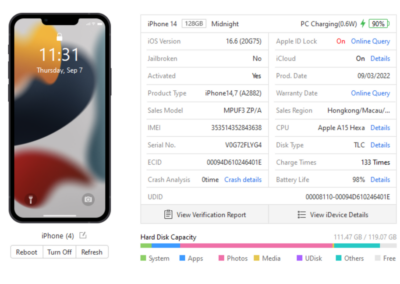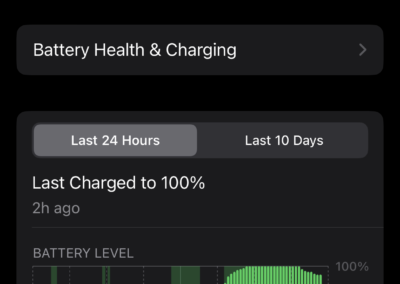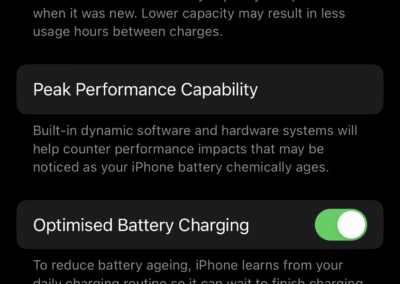Phone Battery Replacement
In this article we explain why we need to replace the phone battery – what cause the issues and how to prolong your battery life (lithium battery)
Why I have to replace phone battery
Phone batteries degrade over time due to a combination of factors, and eventually, you may need to replace them. Here are some reasons why you might have to replace a phone battery:
- Capacity Degradation: Lithium-ion batteries, which are commonly used in smartphones, have a limited number of charge and discharge cycles. Over time, as you use your phone and recharge it, the battery’s capacity gradually decreases. This means your phone will hold less charge, and you’ll notice it doesn’t last as long as it used to.
- Reduced Performance: As a battery ages, it may not be able to deliver the same level of power as it did when it was new. This can result in slower performance and lagging on your phone, especially when running demanding applications or tasks.
- Random Shutdowns: Older batteries may struggle to provide a consistent power supply to your phone. This can lead to unexpected shutdowns when the battery can no longer sustain the device’s power requirements, even if the battery indicator suggests there is some charge remaining.
- Shorter Battery Life: You may find that your phone’s battery life has significantly decreased, and you need to charge it multiple times a day to keep it functional.
- The good fully charge battery can be last over 10 hours under normal usage
- Heat Issues: Older and degraded batteries can sometimes generate more heat during charging or use. This can affect the overall performance of your phone and, in extreme cases, pose a safety risk.
- Battery Health Alerts: Some smartphones have built-in battery health monitoring features. These features might provide notifications or warnings when your battery’s health declines to a certain level, indicating that it’s time for a replacement.
- Safety Concerns: In rare cases, older or damaged lithium-ion batteries can become unstable, potentially leading to overheating, swelling, or even leakage. Replacing the battery can mitigate these safety risks.
- Compatibility with Software Updates: Some smartphone manufacturers may introduce software updates that limit performance or certain features for devices with degraded batteries. Replacing the battery can help restore full functionality.
- Improved User Experience: A new battery can significantly improve your overall experience with your phone by providing longer usage between charges and better performance.
Indicators that you should replace your battery
- One of the most obvious indicator is your phone no longer has good battery life as before, all of sudden after full charge it only last for couple of hours
- iPhone – Setting – Battery Health and Charging, the battery should be replace if the battery health is under 80%
- Battery Cycle count: by using a professional software we can check these information
Battery Health : not under 80%
Cycle counts : not over 600 time
How to increase or prolong your battery life
Battery Self-Drained or drain so fast can be any of these
There are several reasons why your phone’s battery might be draining quickly. Here are some common factors to consider:
- -Screen Brightness: Keeping your screen brightness too high can be a significant drain on your battery. Lower the brightness or enable adaptive brightness/auto-brightness to let your phone adjust it based on the ambient light.
- -Apps Running in the Background: Some apps continue to run in the background even when you’re not using them. Check your phone’s battery settings to see which apps are consuming the most power and consider force-closing or uninstalling them if they are not necessary.
- -Location Services: Apps that use GPS and location services can be power-hungry. You can either disable location services for certain apps or use them sparingly.
- -Push Email: Constantly checking for new emails can drain your battery. Change your email settings to fetch new emails less frequently or manually.
- -Background Sync: Apps like social media, weather, and news often sync data in the background. Adjust the sync frequency or limit the number of apps that sync automatically.
- -Too Many Widgets: Widgets on your home screen may look nice, but they can also consume power, especially if they’re frequently updating.
- -Outdated Software: Make sure your phone’s operating system and apps are up to date. Developers often release updates that can improve battery life.
- Battery-Draining Apps: Some apps are known to be heavy on battery usage. Keep an eye on battery usage stats in your phone’s settings and consider uninstalling or replacing particularly power-hungry apps.
- -Push Notifications: Apps that send frequent push notifications can drain your battery because they wake up your phone’s screen and processor. Review and adjust notification settings for such apps.
- -Background Processes: Some phones have built-in battery optimization features that can limit background processes for apps. Check your phone’s settings for options like “Battery Saver” or “Power Optimization.”
- Network and Connectivity: Weak signal strength, especially with mobile data or Wi-Fi, can force your phone to work harder to maintain a connection, draining the battery faster. Consider using airplane mode in areas with poor signal.
- Screen Timeout: Set a shorter screen timeout interval so that your phone’s screen turns off more quickly when not in use.
- -Battery Health: Over time, batteries degrade, which can result in reduced battery life. If your phone is older, it may be worth considering a battery replacement.
- -Hardware Issues: In rare cases, hardware issues like a malfunctioning battery or other internal components can cause rapid battery drain. If none of the above solutions work, consider having your phone checked by a professional.
- – Do not let your battery running under 20 %



